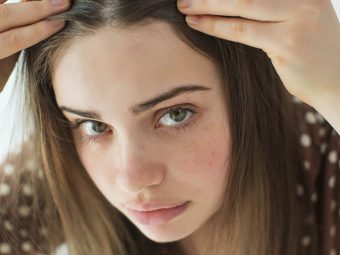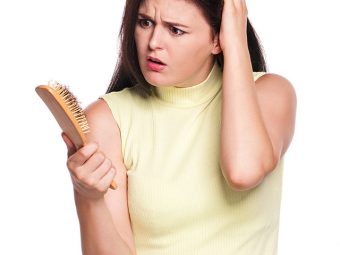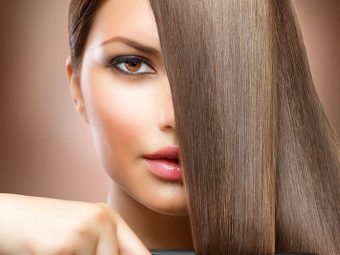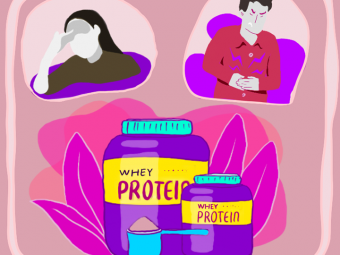10 Common Reasons For Hair Fall That You May Not Be Aware Of

Image: iStock
Are you seeing an increase in the quantity of your beloved hair locks on the hairbrush? Well, it’s time to calm those nerves with these foolproof reasons for hair shedding to help you to take care of it in advance. Hair loss can be caused from a range of reasons, starting from medical issues to external factors (environmental or stress-induced). Though hair fall is a pretty common phenomenon, many don’t understand the complete cycle a single follicle of your hair goes through.
Each hair follicle of yours goes through three phases before actually falling off (1). The first phase is called the Anagen phase, which is an active phase of hair growth. It usually lasts around two to five years. The second phase is the Catagen phase, which is the transitional phase and lasts upto three weeks. And finally, the third and final phase is the Telogen phase. At the end of the Telogen phase, your hair follicles start to fall off. However, the growth cycle of your hair can be influenced by a variety of factors. Here are eleven factors that may be causing your hair fall problems:
1. Age
One of the biggest causes of hair fall is age. Yes, as sad as it is to say, the older you get, the more likely you will lose your hair. This is often due to changes in your hormones and age weakening your immune system. Though it is a common cause, we suggest you identify the proper hair products for your hair type to maintain those luscious locks over the years.
2. Genetics
Another factor that you cannot control is your genetics. Genes can play a crucial role in your hair growth and loss cycle. So yes, if you have parents with premature hair fall, you are more likely to suffer from hair fall as well. Hereditary hair loss can cause a receding hairline in women and bald spots in men as well (2). The only way to reduce genetically-induced hair loss is to consult hair specialists who can recommend accurate long-term medications for a full head of hair.
3. Nutritional Deficiencies
If you notice a sudden increase in the amount of hair falling off your head, you might be suffering from nutritional deficiencies. Many studies have shown a link between telogen effluvium, dietary deficiencies, androgenetic alopecia, alopecia areata, and female pattern baldness. Common nutritional deficiencies that can cause hair loss include a protein deficiency, zinc deficiency, omega three fatty acids deficiency, biotin deficiency, folic acid deficiency, Vitamin A, D, and E deficiency, and a deficiency in antioxidants. If you are concerned about hair loss due to a nutritional deficiency, it’s essential to consult a doctor (3).
4. Crash Dieting
If you are someone who is a fan of crash dieting, you need to stop right now! Crash dieting is the worst way to lose weight and can cause more problems than it can solve. When it comes to weight loss, it’s vital that you exercise and watch your diet. However, trying out crash and fad diets can lead to plenty of hair problems. These extreme diets strip your body of essential nutrients required to keep your scalp healthy.
5. Medications
One of the biggest side effects of certain medications is that they cause sudden hair loss. Medications like anti-hypertensive medications, blood thinners, and medicines used in chemotherapy are some examples. Studies suggest that certain drugs like birth control pills and pills to treat the symptoms of menopause can also cause temporary hair loss (4).
6. Illness
You may have seen that if someone has gone through a long illness, they’ve suffered from severe hair fall. This is because certain conditions like flu, high fever, anemia, or even major surgery can cause you to suffer from additional stress. This, in turn, will impair the normal function of your hair growth cycle. However, you should be relieved to know that this type of hair fall is only temporary and will stop once you have recovered.
7. Stress
Stress is one of the most common causes of hair fall and ends up being like a never-ending cycle. You stress about losing hair and, in turn, lose even more hair! This is because stress causes your body to release a hormone called cortisol that also affects other parts of your body. If you are overly stressed, you will notice that your hair is starting to fall out more and more. It usually begins by thinning hair follicles and eventually lands on your favorite pillowcase. Relatable?
8. Scalp Infections
There are certain infections of the scalp like dandruff, ringworm, fungal and bacterial infections that can lead to you suffering from hair fall. Sometimes, it also leads to itchy and scaly skin that can cause irritation. If the condition is left untreated, it can cause balding and even lead to permanent hair loss.
9. Eating Disorders
Besides the lack of nutrients and following fad diets, those who suffer from eating disorders can also experience significant hair loss. It’s pretty common for people suffering from anorexia nervosa and bulimia nervosa to suffer from hair fall. In this case, hair fall can be attributed to not getting proper nutrition.
10. Trichotillomania
Trichotillomania is an impulse control disorder that can lead to hair loss in a more unnatural way. Those suffering from this condition have a recurrent urge to pull out the hair on their scalp, eyebrows, and other parts of their body. For those dealing with this condition, a psychologist is the best person to talk to (5).
It is understandable that in your busy and hectic life, finding time to take care of your hair can be a task. But it is very important to take some time out for it. As they say, prevention is better than cure. So, if you are experiencing some abnormal or abrupt hair loss due to any of the above mentioned reasons, make sure to seek timely necessary treatment. Feel free to contact hair specialists or dermatologists near you to help you understand your hair-type better. At the end of the day, it’s all about your gorgeous hair to help you slay wherever you go. Do let us know all of your thoughts and comments on this article in the comment section below.
References
Articles on StyleCraze are backed by verified information from peer-reviewed and academic research papers, reputed organizations, research institutions, and medical associations to ensure accuracy and relevance. Read our editorial policy to learn more.
- Telogen Effluvium: A Review
https://www.ncbi.nlm.nih.gov/pmc/articles/PMC4606321/ - Genetics and other factors in the aetiology of female pattern hair loss
https://pubmed.ncbi.nlm.nih.gov/28453904/ - Diet and hair loss: effects of nutrient deficiency and supplement use
https://www.ncbi.nlm.nih.gov/pmc/articles/PMC5315033/ - [Drug-induced alopecia: review of the literature]
https://pubmed.ncbi.nlm.nih.gov/7631289/ - Trichotillomania
https://www.ncbi.nlm.nih.gov/books/NBK493186/






















